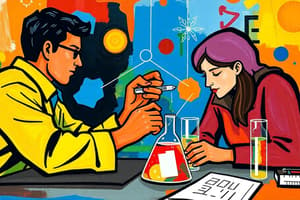Podcast
Questions and Answers
What is the main reason science serves as a cornerstone in general education?
What is the main reason science serves as a cornerstone in general education?
- To limit students' understanding of the natural world
- To discourage students from making informed decisions
- To foster critical thinking and problem-solving skills (correct)
- To focus solely on mastering facts and concepts
Which field of science does the study of living organisms fall under in general education?
Which field of science does the study of living organisms fall under in general education?
- Environmental science
- Earth science
- Life science (correct)
- Physical science
What is a key emphasis in science education within general education, besides mastering facts and concepts?
What is a key emphasis in science education within general education, besides mastering facts and concepts?
- Ignoring critical thinking
- Avoiding natural phenomena
- Memorizing scientific jargon
- Development of scientific inquiry and experimentation skills (correct)
What is the primary purpose of science fostering transferable skills?
What is the primary purpose of science fostering transferable skills?
Which area does physical science cover within general education?
Which area does physical science cover within general education?
What does science education within general education primarily aim to empower students to do?
What does science education within general education primarily aim to empower students to do?
What is one of the primary skills that students develop through science education?
What is one of the primary skills that students develop through science education?
How does science education benefit students' career opportunities?
How does science education benefit students' career opportunities?
Why is communication and collaboration important in science education?
Why is communication and collaboration important in science education?
What is a common challenge faced by general education programs in providing science education?
What is a common challenge faced by general education programs in providing science education?
How does studying science help students make decisions?
How does studying science help students make decisions?
What is a key outcome of science education according to the text?
What is a key outcome of science education according to the text?
Flashcards are hidden until you start studying
Study Notes
General Education: Exploring Science
General education is a foundational aspect of learning that strives to provide students with a well-rounded, versatile set of skills and knowledge. In this article, we'll specifically delve into the science component of general education and how it contributes to a student's overall understanding of the world.
Science in General Education
Science serves as a cornerstone in general education because it fosters critical thinking, problem-solving, and analytical skills. It encourages students to develop a deeper understanding of natural phenomena and empowers them to make informed decisions about the world around them. Science education in general education often includes:
- Physical science: The study of the natural world through the fields of physics, chemistry, and astronomy.
- Life science: The study of living organisms, including biology, ecology, and anatomy.
- Earth science: The study of the Earth's systems, including geology, meteorology, and environmental science.
Science education within general education is not solely focused on mastering facts and concepts, but also emphasizes the development of scientific inquiry and experimentation skills.
Science as a Transferable Skill
Science fosters numerous transferable skills that are valuable in all aspects of life. These include:
- Critical thinking and problem-solving: Learning the scientific method, students are taught to approach problems by asking questions, gathering and analyzing data, and drawing conclusions. This skill is applicable in various settings, such as in academic situations, workplace environments, and personal life.
- Analytical and logical reasoning: Studying science encourages students to think logically and make informed decisions based on evidence. This skill is essential in the workplace and in everyday life.
- Communication and collaboration: Science education often involves group work, presentations, and discussions. These experiences help students develop their communication and collaboration skills, which are essential for success in many fields.
Benefits of Science Education
- Improved understanding of natural phenomena: Science education helps students develop a deeper understanding of the world around them, which can lead to a better appreciation of the natural world.
- Enhanced problem-solving skills: Science education helps students develop problem-solving skills that are applicable in various settings.
- Increased scientific literacy: Science education helps students develop a scientific worldview that enables them to make informed decisions about the world around them.
- Improved career opportunities: Science education can lead to improved career opportunities in various fields, such as engineering, medicine, and technology.
- Increased scientific curiosity: Science education helps students develop a lifelong curiosity about the world around them, which can lead to a happier and more fulfilled life.
Challenges of Science Education in General Education
- Limited time and resources: General education programs often face limitations in terms of time and resources, which can make it difficult to provide students with the science education they need.
- Diverse student populations: General education programs often serve diverse student populations, which can make it challenging to tailor science education to meet the needs of all students.
- Limited access to hands-on experiences: General education programs often face limitations in terms of access to hands-on experiences, such as laboratories and field trips.
Despite these challenges, science education in general education remains a critical component of a well-rounded, versatile education. When students are equipped with a solid foundation in science, they are better prepared to tackle the challenges of the world and make informed decisions about their futures.
[References]
- National Science Foundation. (2021). Science Education in General Education. Retrieved from https://www.nsf.gov/news/special_reports/science_education_in_general_education/
- American Association for the Advancement of Science (AAAS). (2020). Science Education in General Education. Retrieved from https://www.aaas.org/programs/project-2061/science-education-general-education
- National Research Council. (2012). A Framework for K-12 Science Education: Practices, Crosscutting Concepts, and Core Ideas. Washington, DC: The National Academies Press. Retrieved from https://www.nap.edu/catalog/13165/a-framework-for-k-12-science-education-practices-crosscutting-concepts-and-core-ideas
Studying That Suits You
Use AI to generate personalized quizzes and flashcards to suit your learning preferences.




